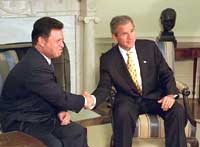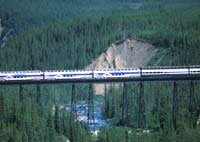It is impossible to conceive of human acts as wholly devoid of humanity as last month’s terrorist attacks on New York and Washington. The nation is reeling, emotionally stranded by confusion, shared suffering, and a stunningly new sense of danger.
But if something good has come out of this paroxysm of grief and alarm it is this: Americans are reconsidering what’s really relevant and what is less so in our national life. Professional sports stadiums, for instance, were empty for a week. Vapid advertising disappeared from television news programs. The Emmy Awards were cancelled. In this unusual moment of national introspection, the progressive political community has a remarkable opportunity to press for a new agenda.
In interviews this week, environmental activists, writers, and leaders from around the nation cautiously shared a common thought: that despite all the horror of Sept. 11, and all the hardship the attack and our own military response will likely produce, there is nevertheless cause for measured optimism.
Indeed these opinion leaders argued that the civic will to build a more just and environmentally safer future never disappeared after the attack, and in fact may well have been strengthened. Consider, for instance, that before Sept. 11, President Bush defended what he called “our economy and the American way of life” by giving foreign nations the back of his hand. Most Americans rejected the president’s view that when it came to global warming, arms control, racism, and a host of other issues, the United States had nothing to gain from cooperating with other nations of the world.

President Bush meets with King
Abdullah of Jordan following the
attacks.
Photo: White House
After Sept. 11, of course, the President called on those same countries for support and spoke of the importance of global unity, an approach that was applauded in the United States and admired around the world.
“On balance this [call for unity] ought to be an improvement in terms of global environmental issues,” said Denis Hayes, organizer of the first Earth Day and now president and chief executive officer of the Bullitt Foundation, an environmental philanthropy in Seattle. “An administration that decided to go it alone on climate change, biological weapons, racism, and Star Wars discovered it needs to function as part of the international community.”
How, for instance, can the United States now turn its back on invitations from its allies to participate in international environmental treaties? “If one wanted to be optimistic, it would be because America is clearly more open to the need for coalitions than it was a month ago,” said Bill McKibben, author of The End of Nature and a visiting scholar at Middlebury College in Vermont. “We have a powerful cause — the fight against terror — that we need the world to rally behind. It will be morally harder for us to dismiss other countries’ vital priorities the next time around.”
Other environmental leaders noted that in the weeks after Sept. 11, the national political debate, while dominated by the attack and its aftermath, nevertheless still included issues critical to communities and the land. In Washington, a bid by conservative senators to use the attack to justify opening the Arctic National Wildlife Refuge for new energy development was soundly rejected as opportunistic.
“It could be that this fall’s tragic events will produce a benefit for land conservation efforts,” said Ben Beach, a senior editor at the Wilderness Society in Washington. “As the nation grapples with its dependence on oil, we think there’s a good chance that we’ll see a new national resolve to use energy more efficiently and to develop sources that are not vulnerable to mad acts of terrorists. Americans do not want terrorists to force us to turn our most special places into oil fields and other industrial sites, especially when there are more sensible options.”
Always Look on the Bright Side of Life

Getting there …
Meanwhile an unconventional coalition of environmentalists, transit unions, public transportation agencies, and others is close to convincing Congress to invest billions in new spending for Amtrak and high-speed rail lines to improve the efficiency of the nation’s transportation system, reduce energy consumption, and relieve congestion.
And although the conservative House voted 226 to 200 against a measure that would have sharply increased investments in land conservation and other environmental programs in the new farm bill, those same programs are being advanced in the Senate by another unlikely alliance of environmental, farm, and local government organizations.
Bill Roberts, the former communications and legislative director for Environmental Defense and now the executive director of the Beldon Fund, a New York-based environmental foundation, said such actions points to a clear conclusion. “One thing the attack did not do was alter the persistent importance of environmental issues to people and the planet,” Roberts said “Global warming, toxic pollution, lost biodiversity, and a long list of other environmental threats did not go away on Sept. 11. Indeed, it is really incumbent on the environmental community to make sure that these critical issues are not ignored, or worse, aggravated by policies emerging from our nation’s response. Now more than ever the environmental movement must demonstrate its vigilance and doggedness.”
To be sure, said those interviewed, there’s plenty to be worried about. The worst is that the methodical bombing now under way in Afghanistan, and the surgical, commando style strikes being discussed in Washington could metastasize into a much larger conflict.
James Kunstler, the author of The Geography of Nowhere and a noted lecturer, foresees a period of intense hardship followed by a restructuring of the American lifestyle. “The economic effects are liable to be severe over time, and are apt to produce political mischief here in the U.S. Eighty percent of the world’s remaining oil reserves will now be controlled by people who hate America,” Kunstler said. “These new circumstances ought to compel us to live more locally, to depend on cars much less than we do now, to begin immediately to reconstruct a meaningful intercity rail network, and to prepare ourselves to re-organize both commerce and agriculture on a smaller and far more local or at least regional basis. The American Dream of a permanent drive-in utopia died on Sept. 11.”
As this new order of things takes shape, environmental organizations and those that support them will struggle like everybody else with how to position themselves, how to keep a firm grip on their own relevance, and how to finance their programs.
Roberts described the economic effects of the attacks as “a second shock wave … hitting the movement. New projects will be shelved for a while and organizations will be struggling to keep things afloat. In addition, the downturn has hit state and local governments as tax revenues decline and budget cuts loom larger. “
“Government-funded environmental programs, especially enforcement, are especially vulnerable right now,” Roberts said “This economic shock will push industry to argue more vigorously against tighter environmental controls.”
Strategists counsel environmentalists and their organizations not to lose focus.
“There’s so much uncertainty about what will
happen next that it would be a wild guess to even try to predict the likely trends for six weeks, let alone years,” said Bob Schaeffer, a Florida-based media and strategic planning consultant to national environmental and civil rights organizations. “In general I’m pessimistic about the short-term impact on environmental causes, if only because they are being pushed off center stage. But I’m optimistic about the longer run since the terror attacks have been a grim reminder of the importance of the public sector in preserving the services the nation most values.”
“In volatile and uncharted times like this,” added Beach, “it is tougher than ever to predict the public mood. Our public lands will always face threats from those who think commercial development is the way to go. But put me down as an optimist on Americans and the environment. I don’t think the people of this country can be convinced that we have to resign ourselves to dirtier water and air and the industrialization of our prized natural areas in order to combat terrorism.”


